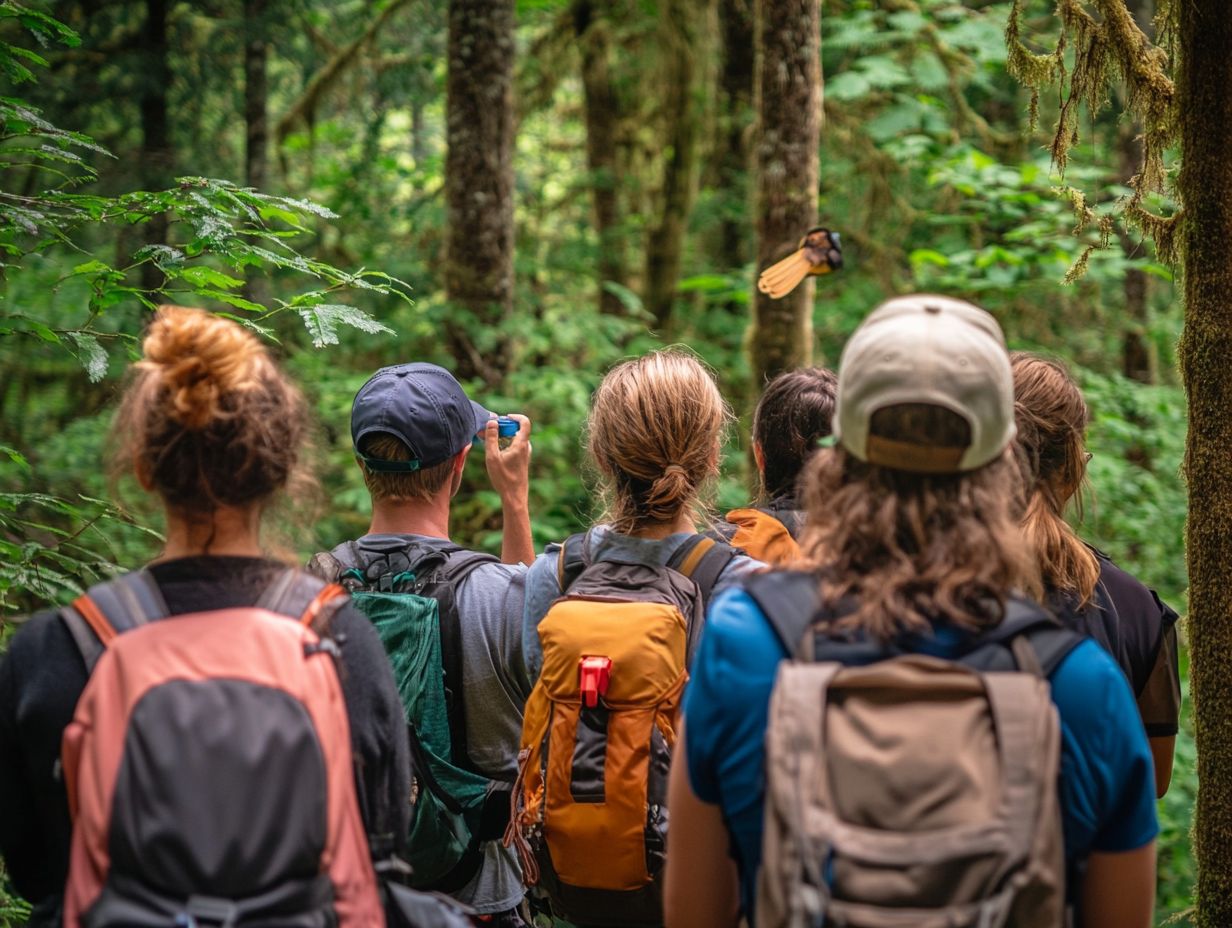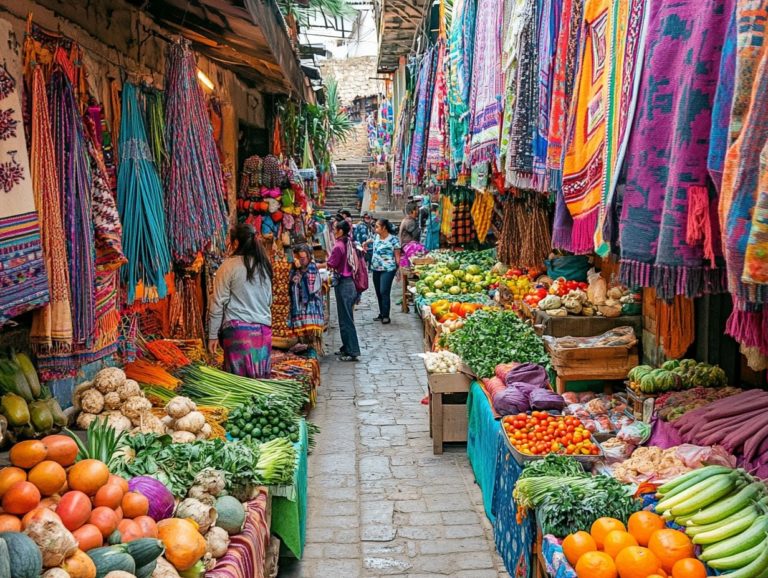How to Engage in Eco-Conscious Tourism
Eco-conscious tourism transcends mere travel trend; it embodies a profound commitment to safeguarding our planet while enhancing your travel experiences through nature-based travel and environmental consciousness.
This article delves into the essence of eco-conscious tourism, highlighting its importance for local communities and ecosystems. It also offers practical steps for you to become a responsible traveler and engage in sustainable travel.
By choosing sustainable accommodations and participating in eco-friendly activities, you can discover how your decisions can affect positive change. This is especially true through conservation efforts and community empowerment.
Now is the perfect time to transform the way you travel for the better.
Contents
Key Takeaways:

- Understand the importance of eco-conscious tourism to protect the environment and support local communities.
- Be a responsible traveler by following practical tips for sustainable travel and choosing eco-friendly accommodations.
- Support eco-tourism activities and contribute to the local economy and culture for a more meaningful and impactful travel experience.
Understanding Eco-Conscious Tourism
Understanding eco-conscious tourism is essential in today s world, especially as you seek travel experiences that resonate with your values. This type of tourism highlights sustainable travel practices that prioritize environmental awareness, the well-being of local communities, and the preservation of natural resources.
As your demand for eco-friendly experiences grows, destinations worldwide from the lush rainforests of Costa Rica to the pristine landscapes of New Zealand and even the Galápagos Islands are reimagining their tourism models to embrace the principles of ecotourism. To enhance your travel choices, consider learning how to find eco-conscious destinations. By recognizing and supporting this movement, you can play a vital role in protecting different plants and animals and promoting responsible tourism.
Defining the Concept and Its Importance
At its essence, ecotourism represents a responsible travel philosophy that prioritizes environmental education and cultural preservation. It seeks to minimize the detrimental effects of tourism on natural habitats and local communities while promoting biodiversity conservation and cultural preservation.
This approach helps you enjoy and appreciate nature while simultaneously enhancing the well-being of indigenous populations through sustainable economic opportunities, particularly in countries like Bhutan and Kenya. By focusing on activities that honor local ecosystems and involve green transportation, ecotourism fosters a deeper understanding of biodiversity and highlights the necessity of protecting delicate environments.
It instills a sense of stewardship in you, encouraging a greater awareness of your impact on the environment and inspiring collective efforts to support conservation initiatives, such as those led by organizations like the Sheldrick Wildlife Trust and Global Federation of Animal Sanctuaries.
Ultimately, ecotourism serves as a vital connection, linking you to the rich cultural narratives and environmental challenges of the destinations you explore. This not only enriches your travel experience but also positively impacts the communities you visit.
Benefits of Eco-Conscious Tourism
Eco-conscious tourism offers many benefits that extend far beyond the individual traveler. It positively influences local communities, safeguards natural environments, and nurtures a sustainable economy that is essential for future generations.
By choosing eco-friendly accommodations and participating in low-impact activities, you play a vital role in reducing carbon emissions and bolstering conservation efforts on a global scale.
This approach to tourism is more than just a passing trend; it represents a significant shift towards community enablement and environmental stewardship, including initiatives in places like Florida and the Amazon.
Take the first step towards responsible travel today!
Positive Impacts on Local Communities and Environment
The positive impacts of eco-conscious tourism on local communities and the environment are truly profound, especially when you engage in low-impact activities that promote sustainability. By fostering biodiversity conservation and cultural preservation, you re not just enjoying a getaway; you’re supporting the very regions you visit.
When you emphasize ethical ecotourism practices, such as those advocated by David Fennell and Paul Rosolie, you empower local residents. You also immerse yourself in experiences that honor cultural heritage and promote environmental stewardship.
Take Iceland, for example, where you’re encouraged to explore breathtaking landscapes through guided eco-tours that spotlight local knowledge and conservation efforts.
In Florida, eco-conscious activities like kayaking through mangroves and participating in wildlife recovery programs contribute to preserving unique ecosystems. These experiences illustrate how sustainable travel can create a harmonious relationship between you and the communities you visit, including engaging with local artisans and participating in conservation efforts.
How to Be an Eco-Conscious Traveler

Embracing the role of an eco-conscious traveler means adopting sustainable practices that foster environmental awareness and respect for local cultures, while understanding the importance of your carbon emissions.
Simple yet effective choices, like selecting eco-friendly accommodations, utilizing green transportation, and engaging in low-impact activities such as guided eco-tours, can greatly enrich your travel experience. These choices pave the way for a more sustainable future.
By focusing on these smart choices, you can minimize your carbon footprint and actively contribute to conservation efforts, truly embodying the spirit of ethical ecotourism.
Practical Tips for Sustainable Travel
Practical tips for sustainable travel enable you, the eco-conscious traveler, to make informed choices that significantly reduce carbon emissions and embrace ethical ecotourism principles, ensuring a more responsible approach to travel.
By adopting these strategies, you can minimize your environmental impact while savoring rich, immersive experiences that reinforce your commitment to conservation efforts. Opting for sustainable transportation, such as bicycles or public transit, can dramatically lower your carbon footprint.
Supporting locally owned restaurants and artisan shops not only ensures that your money remains within the community but also helps preserve local culture.
Engaging in environmental education programs or guided eco-tours allows you to learn about conservation efforts firsthand and interact with your surroundings responsibly. By prioritizing these practices and understanding the benefits of visiting eco-friendly destinations, you can contribute to a healthier planet and promote sustainable living, all while enjoying your adventures.
Choosing Eco-Friendly Accommodations
Choosing eco-friendly accommodations is one of the most important things you can do! It allows you to support practices that reduce environmental impact while simultaneously bolstering local economies.
This conscious choice not only reflects your commitment to the planet but also enriches your travel experience by connecting you with communities striving for a greener future.
Join the movement for a greener planet make your travel choices matter!
Evaluating and Selecting Responsible Accommodation Options
Evaluating and selecting responsible accommodation options means considering the establishment s green practices and efforts to help local communities, which can include partnerships with organizations like Junglekeepers.
This evaluation involves examining key factors, such as energy efficiency measures. These might be indicated by certifications like LEED, which stands for Leadership in Energy and Environmental Design or Energy Star ratings. Additionally, look for recycling programs. Effective waste management strategies, including recycling and composting initiatives, are crucial for minimizing the property’s ecological footprint.
Look for ways the accommodation engages with the local community, illustrated through partnerships with local artisans or organic farms, fostering economic growth and enriching cultural exchange.
Ultimately, choosing accommodations that embrace sustainable practices not only benefits the planet but also enhances your travel experience in meaningful ways.
Participating in Eco-Tourism Activities
Engaging in eco-tourism activities offers a fulfilling chance to connect with nature, champion conservation initiatives, and uplift local communities through programs that emphasize environmental education, which means teaching people about how to protect the environment all while savoring enriching travel experiences.
Eco-Friendly Activities and Tours to Support

You have a wealth of eco-friendly activities and tours at your fingertips that not only enhance your travel experience but also play a vital role in protecting the variety of life on Earth and education for both travelers and local communities, such as those found in national parks across the globe.
Take, for example, guided nature walks in Costa Rica. Here, you can immerse yourself in the breathtaking diversity of flora and fauna while soaking up insights from local experts about sustainable practices, including the importance of reducing carbon emissions. Additionally, learn how to plan a sustainable travel itinerary that includes activities like kayaking through the mangroves of Thailand, which offers you a unique vantage point of the ecosystem while simultaneously helping to prevent erosion and protect wildlife habitats.
Volunteering on organic farms in Italy presents another rewarding opportunity; you ll gain hands-on knowledge of sustainable agriculture while supporting local farmers in cultivating their lands responsibly. Joining these activities not only deepens your connection with nature but also ensures that local communities reap the economic and social benefits of eco-tourism initiatives, paving the path for community empowerment.
Supporting Local Communities
Supporting local communities is essential to eco-conscious tourism, allowing you to engage directly with local economies. This approach enhances your travel experience while helping preserve local cultures and empowering communities.
Ways to Contribute to the Local Economy and Culture
Contributing to the local economy and culture during your travels means making choices that prioritize local businesses, cultural experiences, and community enablement initiatives.
By actively engaging with the vibrant ecosystem of local artisans, you can enrich your journey while directly supporting those who call these places home. For instance, when you purchase handcrafted jewelry or textiles from nearby markets, you re not just giving financial support to local crafters; you re also taking home unique memories infused with cultural significance.
Dining at family-run restaurants allows you to savor authentic cuisine, ensuring that profits stay within the community and fostering a more sustainable food system. Participating in local festivals gives you the chance to immerse yourself in rich traditions, enhancing your appreciation and understanding of diverse cultures while significantly boosting local tourism revenue.
Frequently Asked Questions
What is eco-conscious tourism?
Eco-conscious tourism, also known as sustainable tourism, is a type of travel that focuses on minimizing negative impacts on the environment while promoting the conservation of natural resources and supporting local communities.
Why is it important to engage in eco-conscious tourism?

Engaging in eco-conscious tourism helps protect the environment. It promotes sustainable practices while supporting local communities and preserving cultural heritage for future generations.
What are some ways to engage in eco-conscious tourism?
Choose eco-friendly accommodations for your stay. Support local businesses and buy sustainable products.
Reduce waste and your carbon footprint. Join local eco-tours to make a positive impact.
How can I find eco-friendly accommodations?
Research online for eco-friendly hotels and look for eco-label certifications. Read reviews from other travelers and ask hotels about their sustainable practices.
What can I do to reduce my carbon footprint while traveling?
Use public transportation, walk, or bike instead of taking taxis. Carry a reusable water bottle and shopping bag to cut down on waste.
How can I support local communities while traveling?
Buy from local businesses and stay in locally owned accommodations. Join community-based eco-tours to boost the local economy and create job opportunities.






